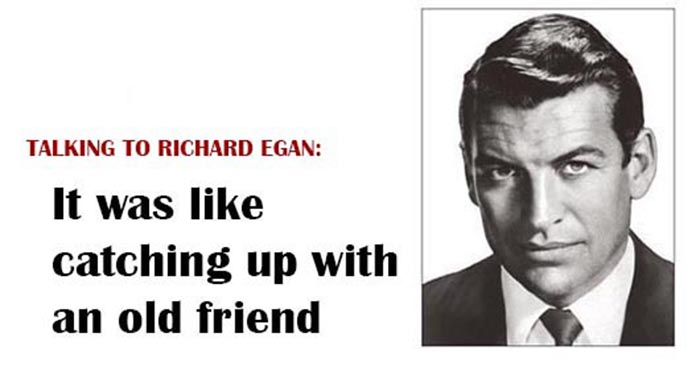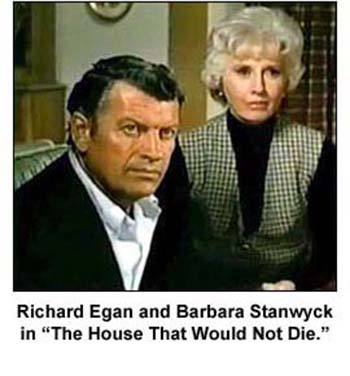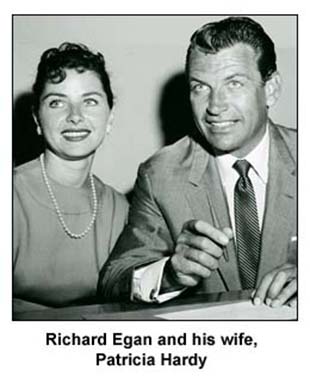This phone interview from October 1970 with veteran actor Richard Egan sounded like a scene from "Marty." This is how my story appeared in the Providence Journal.
By JACK MAJOR
TV-Radio Editor
Major: “What are you doing these days?”
Egan: “Not much. What are you doing?”
Major: “About the same.”
Egan: “Did you watch the World Series?”
Major: “Yeah, but I’d rather not think about it. I was rooting for the Reds.”
Egan: “That Brooks Robinson. He’s too much.”
Major: “Sure is.”
Egan: “So how’s the weather?”
Major: “Funny. Some days we freeze our tails off, then others it’s like the middle of summer.”
Egan: “It’s beautiful out here.”
Major: “Always is, isn’t it?”
Egan: “Yeah.”
Major: “So what are you doing these days?”
Egan: “Well, I’ve got an ABC Movie of the Week coming up in a few days – ‘The House That Would Not Die.’ Best thing to come along for me in a long time.”
Major: “Things are tough, eh?”
Egan: “Sure are. You wouldn’t believe the things they want an actor to do these days. There’s enough work around, but only if you’ve got no embarrassment.”
Major: “So where do you draw the line?”
Egan: “Well, I don’t like to do things I’d be ashamed to let my children see.”
Major: “So what have you been doing, besides the ABC movie, that is?”
Egan: “Oh, last year I did a thing with Lana Turner called ‘The Big Cube.’ It was all about LSD. They finally released it, but it wasn’t much. Then I got involved in a project with an independent filmmaker, but he ran out of money and couldn’t finish it. You might say things have been slow.”
Major: “What can you do about it?”
Egan: “Pray a lot. And hope someone comes along with a good idea for a TV series. That’s what I’d like to do.”
Major: “More and more actors are looking to television. Why?”
Egan: “I think part of the reason is what I mentioned before – the things they want actors to do in movies. The new liberty in films has been taken over by the nudie people – or those way down the line as far as artistry is concerned. They really don’t take time with their projects. If their scripts have gaping holes in them, they just insert of few shots of naked bodies, or girls sleeping with girls, or boys sleeping with boys. There are exceptions. ‘Patton’ is a good example of a great film that took advantage of the new maturity.”
Major: “What about this ABC Movie of the Week?”
Egan: “ ‘The House That Would Not Die’ is the story of a woman (Barbara Stanwyck) who acquires a home in Pennsylvania. It’s a beautiful home, well kept, but it’s haunted. I play a professor who lives next door. I go over to meet my new neighbor and welcome her and wind up agreeing – rather reluctantly – to help chase away the spirits. But the spirits win, ultimately taking control of our bodies. It’s not a happy ending and not a sad ending. Aaron Spelling, who produced the film, and several others in this series, has a way of hitting things pretty much on the nose.”
Major: “To pick up cash between acting jobs, have you considered doing TV commercials?”
Egan: “I’ve considered it, but the only one I’ve ever done was a holiday commercial for Chrysler when they sponsored my old series, ‘Empire.’ “
Major: “Well, if not commercials, how about the stage?”
Egan: “I’d like to do ‘Othello’ out here, but it’s only a thought so far. It’s not too far-fetched, either. Los Angeles is becoming a very busy theater town.”
Major: “Have you thought about directing, either on stage or in television?”
Egan: “I wouldn’t mind it, but I’d never try to direct myself. You just couldn’t be objective about it. You’d never know how awful you were.”
Major: “You think that’s Jerry Lewis’s trouble?”
Egan (laughing): “Yeah, maybe that’s it.”
Major: “So what are you going to do next.”
Egan: “I don’t know. Your guess is as good as mine.”
SO IF YOU ARE at all interested in Richard Egan, you’d better watch “The House That Would Not Die.” You might not get another chance to see him for awhile.
(The ABC movie was presented October 27, 1970.)



 The interview was designed to promote an ABC Movie of the Week, "The House That Would Not Die," co-starring Barbara Stanwyck and produced by Aaron Spelling.
The interview was designed to promote an ABC Movie of the Week, "The House That Would Not Die," co-starring Barbara Stanwyck and produced by Aaron Spelling.